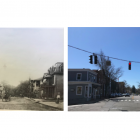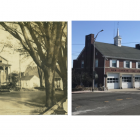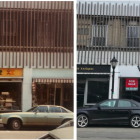News
New Canaan Now & Then: First Baptist Church of New Canaan
|
Most may be familiar with this building today, but it is almost unrecognizable in this c 1910 photo.
This the first Baptist Church in New Canaan, which now stands at 62 Main Street. This church was built in 1872 by the local New Canaan Baptist congregation. Like every religious congregation in town, the local Baptists had grown tired of spending their Sundays traveling from New Canaan to either Stamford or Norwalk for their services. The project was spearheaded by Watts Comstock. Comstock’s involvement would not have been a surprise to residents at the time as his parents, Enoch and Anna, were the first Baptists in New Canaan. The first service in the church was held on February 6, 1873, and the parishioners included the Tuttle, Weed, Selleck, and Benedict families. The baptism immersion pool was located under the pulpit, but most converts preferred to head down the hill to be baptized in Mill Pond. However by the turn of the century, attendance started to wane, and there were no longer the funds to keep the building. In 1908, the building was sold to Dr. James W. McLane, who immediately started to expand the building. The back of the church was expanded. He did bump out the front of the building by a few feet so the exterior walls were flush with the front entrance. Once work was done, Dr. McLane, along with a group of summer residents, financed the “Young Men’s Club” or the “Boys Club.” With space for a reading/club room along with a gymnasium, it was essentially a precursor to the YMCA. However, despite the improvements, interest in the club was so low by 1913 that the building was given to the library for its building fund. The library stayed in its Elm Street location and 62 Main was rented out to future Selectman George T. Smith and his business partner Segbert S. Brinckeroff. The pair converted the building into the Suburban Theater, a movie theater and playhouse. Tickets were a dime and show times were often listed on the front page of the Advertiser. Acts such as Harry L. Bill, a blind banjo player, drew standing room only crowds. Other acts were not so lucky. One act from Springdale was booed off stage after only five minutes and the Advertiser reported they “beat it before the grocer could fetch some eggs to throw at them.” When the Suburban Theater folded it was replaced by the Pleasant Hour Theater, which seems to have almost immediately closed. The property was then sold to Francis E. Green, who started his real estate firm in the building. Green later became a major developer of much of the downtown area of New Canaan. In 1917, Green sold the building to the local chapter of the Masonic Order, Harmony Lodge No. 67.




